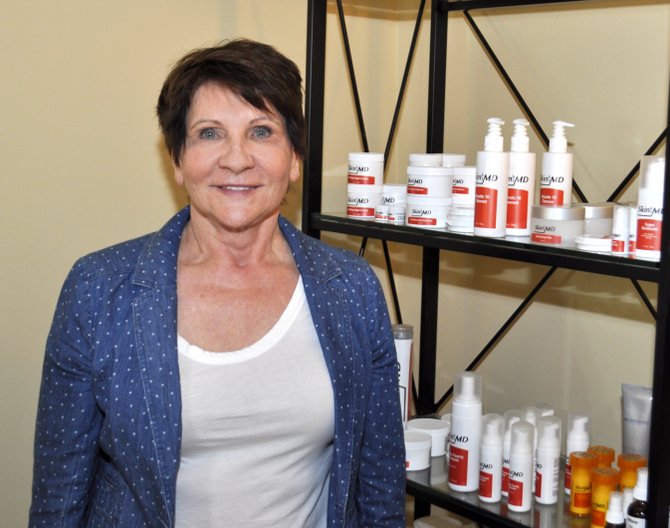Consulting with an esthetician such as Diane Henson of Skin by MD is important to ensuring the success of a skin-care regimen. Photo by Trip Burns
If you laid an average human's skin out on the floor, it would span about 20 square feet. Three Michael Jordans could fit on it and still have a little room to spare. Your skin is the largest organ in your body and also the most important because it keeps your insides protected.
Human skin is composed of three layers: the epidermis, the dermis and the hypodermis. The epidermis is the outermost layer, providing a waterproof barrier and our skin tone. The dermis contains tough connective tissue, hair follicles, and sweat glands, and the hypodermis is composed of fat and connective tissue.
Even though it's our most vital organ, we often treat our skin terribly. We pick scabs, we wear makeup, we tan, we don't worry about the effects of UVA and UVB rays. Then age starts to set in, and suddenly, our skin isn't the same.
"The older you get, the more the skin tends to hang on to dead cells," says Diane Henson, an esthetician and a partner at Skin by MD in Highland Village. "If you see these young girls, say, 15 to 25, and they have plump, dewy (skin) that always looks rosy—past 25 that starts to slow down. By the time you hit 40, it's really slow, and when you hit 50, someone slammed on the brakes."
We're all privy to this inevitable process. Men and women alike begin to complain about skin aging more and more as they near (and then surpass) 30. Even though you can't truly reverse the aging process, you can take measures throughout your life to keep your skin lively and healthy.
The first step to taking care of your skin is knowing what type you have. It's best to get a consultation with an esthetician or a dermatologist before starting a skin-care regimen. For example, Henson says some sensitive-skinned people may not actually have sensitive skin. They may just be using the wrong products.
Henson has been a licensed esthetician for 20 years. She got her license from Shirley Little Academy and did an apprenticeship with Suja Sing at Wavelengths. Sing left Wavelengths to open Pretty Woman. Henson bought her out and created Skin by Diane Henson in 1991. In 2009, she partnered with Dr. Mitsy Ferguson to create Skin by MD (4500 N. Interstate 55, Suite 215, 601-212-0955).
Skin Types:
Normal: no or few imperfections, no severe sensitivity, barely visible pores, radiant complexion.
Combination: overly dilated pores, blackheads, shiny skin
Dry: dull, rough complexion, almost invisible pores, red patches, less elasticity, more visible lines
Oily skin: large pores; dull, shiny, or thick complexion; blackheads; pimples; and other blemishes
(source: webmd.com)
The most common skin type is combination because skin changes on a daily basis, based on factors such as environment and hormone levels. You may have oily skin in Mississippi but it could dry out if you go to a drier place such as Arizona.
Skincare Jibber Jabber
Microdermabrasion: A machine uses fine pressurized crystals that break lose the dead skin cells and then vacuums them out.
Glycolic acid: A fruit acid that dissolves the "glue" that keeps dead skin cells attached to the skin
Vitamin C: This vitamin contains anti-oxidants that fight free radicals (unstable molecules that damage collagen and dry out your skin).
Polypeptides: Communicates to skin cells to produce more collagen
(source: examiner.com)
Retin A: a form of retinol (vitamin a) most commonly used to treat acne but also helps with stretch marks and helps the skin produce more collagen.
(source: wikipedia)
Collagen: Part of our connective tissue that helps the keep the skin firm and supple and also aids in the renewal of skin cells.
(source: news-medical.net)
UVB rays: The sun rays that burn the outer layer of skin.
UVA rays: The sun rays that penetrate the skin and do damage.
Common Skin Diseases and What Aggravates Them
• Rosacea: hot, spicy foods, alcohol and stress
• Acne: rich, fatty foods and soft drinks
• Hyperpigmentation (areas of darkened skin): sun exposure and certain medications and illnesses
Out of the three, only hyperpigmentation can be cured. Acne and rosacea remain forever, but you can keep it under control if you go to an esthetician regularly and have a good skin program.
Diane's Recommended Skin Regimen
• A good cleanser
• For exfoliation, alternate Retin A (tretinoin) with Vitamin C. Don't use Retin A every day because it does damage over a period of time. It makes skin vulnerable, but can be offset with Vitamin C. Keep in mind that not all Vitamin C products are equal. Diane says it depends on how the product was formulated. It has to be formulated with molecules small enough to penetrate the skin and the product has to be stabilized to keep the vitamin from oxidizing.
• Diane's favorite skin hydration method is using Vitamin B with polypeptides.
• Wear at least 20 SPF sunscreen daily, even on cloudy days, on your neck and decolletage (your upper chest and shoulders). Those are the most vulnerable areas. It's not important to buy makeup with SPF, as it's normally 15 or lower. In picking sunscreen, make sure it has at least 70 percent zinc oxide to combat against UVA rays. For sensitive skin, a higher SPF isn't necessary unless you're going to spend all day on the beach.
Diane's Healthy Skin Tips
• Use sunscreen every day.
• Eat a healthy diet.
• Exercise.
• Drink plenty of water.
• Hydrate your skin. The water we drink hydrates our body, but it doesn't do much for our skin.
• Wash your face every morning and every night.



Comments
Use the comment form below to begin a discussion about this content.